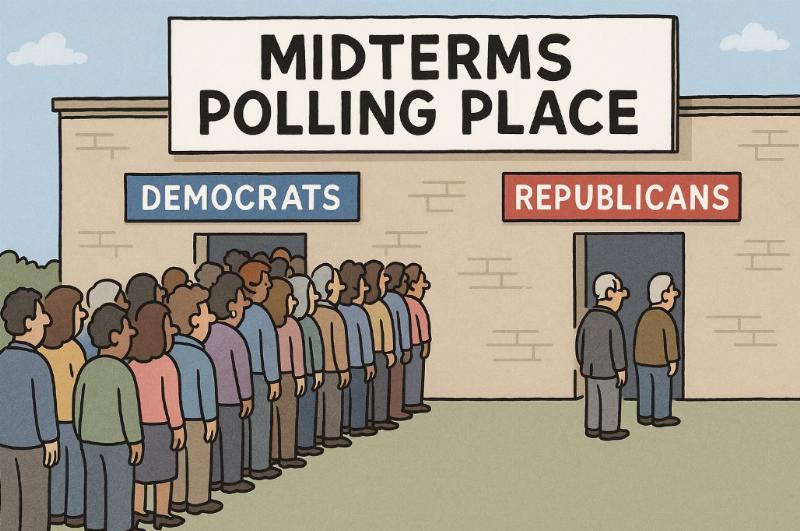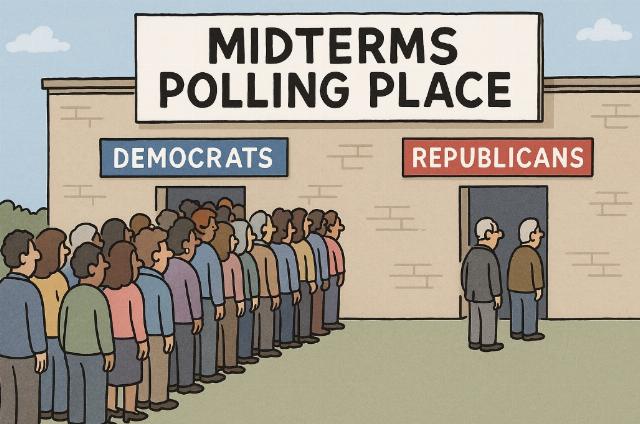


Two Republican losses in state senate special elections this year, first in Pennsylvania during March and then in Iowa this August, have sent tremors through conservative circles. Both seats were previously held by Republicans, both were in areas that strongly supported Donald Trump, and both slipped away despite the Democrat party enduring its worst period of public standing in decades.
These results are not signals of a collapsing Republican coalition, but they are warnings against complacency.
Between 2020 and 2024, Democrats faced a voter registration crisis that left their party infrastructure gutted in states across the country. In every state that tracks affiliation, Democrats lost ground to Republicans as millions of Americans rejected progressive orthodoxy. Over this period, more than two million individuals left the Democratic Party altogether, representing a swing of about 4.5 million voters away from their ranks and toward a rightward realignment.

Image created using AI.
These numbers reflect a larger rejection of the Democrat platform, one that more and more Americans rightfully view as radical and detached from everyday concerns.
By 2023 and 2024, polls showed the Democrats’ national approval rating collapsing to levels rarely seen in modern history, with voters judging their agenda as elitist and out of touch. By early 2025, their favorability dropped to the lowest point in more than three decades, reinforcing the perception of a party trapped by its own missteps and failing leadership.
For Republicans, this landscape seemed to promise electoral dominance. After all, Trump’s policies focus on workers, economic sovereignty, and America-first priorities. They continue to resonate with the broad swath of the electorate. Yet, despite Democrats’ collapsing registration numbers and abysmal popularity, they have managed to capture momentum in the type of races that slip under the radar: special elections.
The first warning came in March, when Republicans lost a Pennsylvania State Senate seat in a district Trump had carried handily. Democrats, energized by their national status as the out-of-power party, poured their efforts into turning out reliable voters. They succeeded not because their brand had suddenly improved but because they understood a simple truth: off-year contests usually tilt toward whichever party is not in control of the White House.
This pattern repeated itself in August in Iowa, where Democrats flipped another Republican seat. The district was no ordinary swing area. It was deep in Trump country, a place that once stood as a symbol of conservative dominance. The loss ended the GOP’s supermajority in the Iowa Senate, giving Democrats a symbolic win that garnered national attention.
It is essential to frame these outcomes properly. Democrats did not win because their ideas suddenly became attractive or because their national reputation rebounded.
They won because their voters were more motivated to turn out in lower-profile contests. Despite hemorrhaging registration numbers and limping under historically bad approval ratings, Democrats displayed intensity and hunger when given an opportunity to dent Republican strongholds. This is standard political behavior for a party out of national power, and history is replete with examples of it.
For Republicans, the lesson is clear: numbers on paper do not matter if supporters stay home. Voter registration advantages, poll leads, and favorable demographics all mean little if enthusiasm is one-sided. That is the real story behind these two state senate losses.
Democrats have also gained a new advantage that alters turnout dynamics.
Their coalition is increasingly dominated by college-educated voters, a demographic with a higher propensity to show up in special and off-year elections. This marks a reversal of past decades, when Republicans typically held the edge in voter reliability. The professional, degree-holding base that Democrats now rely on turns out at higher rates than the working-class backbone of the GOP, which has less historic consistency in non-presidential contests.
This shift matters. In 2016 and 2024, Republicans thrived on high energy from blue-collar and rural Americans who turned out for Trump in record numbers. But special elections are different: they reward consistency, habit, and a willingness to vote even when little seems at stake. Democrats’ college-heavy base supplies that kind of turnout discipline.
Republicans should not read these two state races as a prophecy of disaster for November 2026. Special elections are notoriously unreliable predictors of midterm outcomes. History shows that the party holding the presidency typically suffers in midterms, and Republicans will be in that position of weakness when Americans vote in 2026.
The results in Pennsylvania and Iowa are not evidence that the GOP is collapsing, but they are warnings that motivation cannot be taken for granted.
The Democrats’ brand remains in tatters. Their voter registration levels are perilously low. They have lost millions of supporters over the last several years. They are deeply unpopular with working Americans, particularly in the industrial heartland and among those who feel the weight of inflation, crime, and cultural upheaval.
None of that has changed. But their intensity to show up in off-year special elections has proven stronger than that of Republican voters.
For non-lefties, the implications are sobering. Democrats, even in their weakened state, can still outmaneuver Republicans in contests where turnout is the only variable that matters. If Republicans grow complacent, assume demographic advantage is destiny, or fail to motivate their supporters, they will lose battles they should win. And if that complacency carries over into the 2026 midterms, the damage will not be symbolic. It will sabotage the second half of Trump’s presidency.
The path forward is clear. Republicans must reawaken the energy that drove millions of working-to-middle-class Americans toward the polls in 2016, 2020, and 2024. They must remind their voters that every election, no matter how small, contributes to whether America advances toward prosperity or sinks into progressive decline. They must rebuild turnout operations that match the consistency of Democrats’ college-educated base.
Above all, they must communicate that victory requires participation in every fight, not just the high-profile contests.
The Iowa and Pennsylvania losses are reminders of what happens when motivation wanes. They do not spell doom for 2026, nor do they indicate a reversal of the broader trends favoring Republicans. But they do demonstrate that Democrats, even with horrendous unpopularity and collapsing registration numbers, can still win when their side shows up and the other side does not. That is the only advantage Democrats have right now. It is one Republicans cannot afford to give away.
Ultimately, political races are not won by statistics on paper or approval ratings in polls, but by living, breathing citizens who care enough to cast a ballot. Every special election loss is a reminder that the fate of the country is decided not in headlines but in turnout. If Republicans allow Democrats, with their crumbling brand and dwindling registration, to outwork them at the ground level, then all the favorable trends in the world will not save the movement.
Motivation, not mathematics, will determine whether America continues on the path of renewal or slips back into the hands of those who have already proven their policies to be failures.
Dr. Joseph Ford Cotto hosts and produces News Sight, speaking the data-driven truth about economic and political issues that impact you. During the 2024 presidential election, he created the Five-Point Forecast, which correctly predicted Trump’s national victory and the outcome in all swing states. The author of numerous nonfiction books, Cotto holds a doctorate in business administration and is a Lean Six Sigma Certified Black Belt. During 2014, HLM King Kigeli V of Rwanda bestowed a hereditary knighthood upon him. It was followed by a barony the next year.
